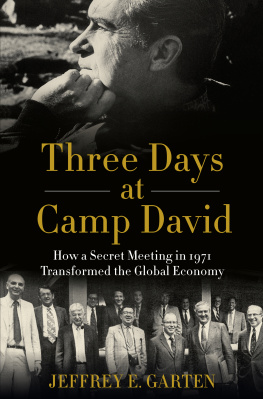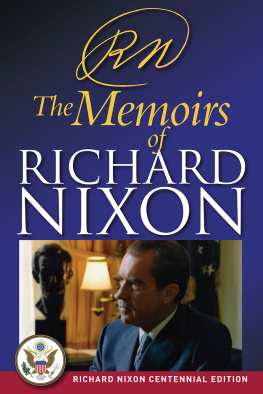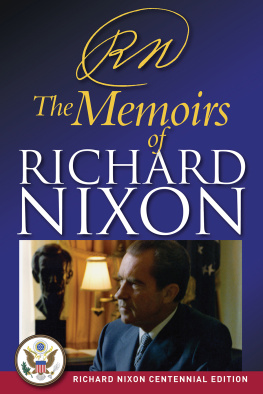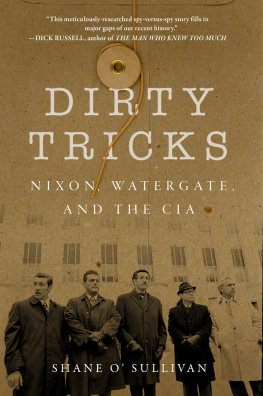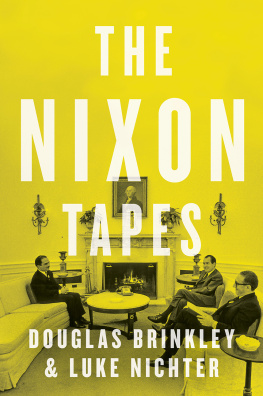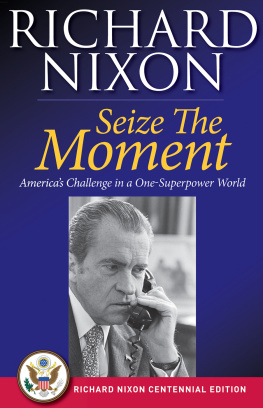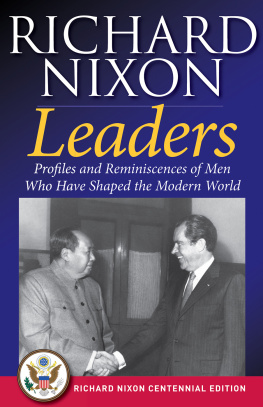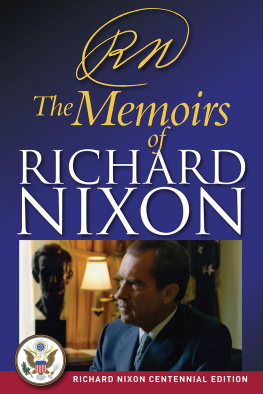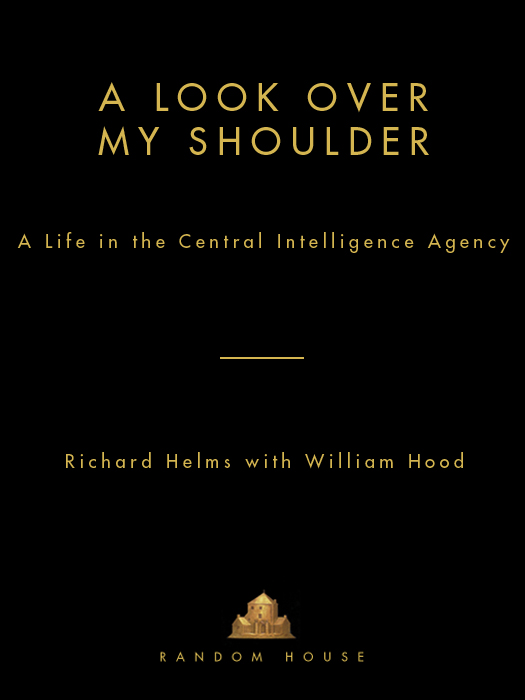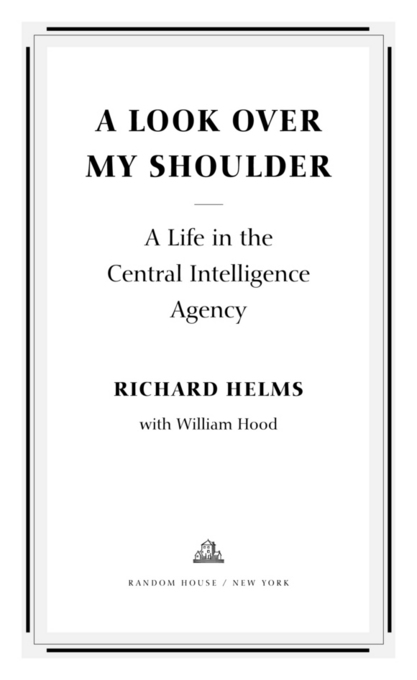Copyright 2003 by the Estate of Richard Helms
Copyright 2003 by William Hood
Foreword copyright 2003 by Henry A. Kissinger
All rights reserved under International and Pan-American Copyright Conventions.
Published in the United States by Random House, an imprint of The Random House Ballantine
Publishing Group, a division of Random House, Inc., New York, and simultaneously
in Canada by Random House of Canada Limited, Toronto.
R ANDOM H OUSE and colophon are registered trademarks of Random House, Inc.
Library of Congress Cataloging-in-Publication Data
Helms, Richard.
A look over my shoulder: a life in the Central Intelligence Agency / Richard Helms
with William Hood.
p. cm.
eISBN: 978-1-58836-309-1
1. Helms, Richard. 2. United States. Central Intelligence AgencyBiography.
3. Intelligence officersUnited StatesBiography. I. Hood, William. II. Title.
UB271.U52 H454 2002 327.12730092dc21
[B] 2002035262
Random House website address: www.atrandom.com
v3.1
To my beloved Cynthia
PREFACE
This is a memoir that I never expected to write.
On February 2, 1973, I was driven home for the last time in the official car of the director of Central Intelligence (DCI). This followed what for me had been an emotional farewell to hundreds of colleagues in the atrium of the Agency headquarters. They had gathered there on short notice after the unexpected swearing-in of new Nixon appointees earlier that day. James Schlesinger, my successor at CIA, was among those sworn in. So, in a matter of minutes it was over. I was no longer in charge. The velvet curtain had slipped into place. I was on the outside. My life in intelligence was behind me.
When I left government after serving four years as ambassador to Iran, I had no thought of writing about my thirty years in intelligence. I believed in the ban against revelation of intelligence secrets, and while in CIA had enforced it. I had every intention of keeping my mouth shut and my pen in the desk drawer. Although I had been circumspect when interviewed by Thomas Powers, and had limited my answers to correcting personal data he had assembled, when his book was published I realized that some of my former colleagues had been more forthcoming. In the event, the books title, The Man Who Kept the Secrets, seemed to bear out my intentions in speaking to Powers.
In 1975 a volcano in the form of the Church and Pike Committees hearings in Congress erupted. Between the committees demands for files and Director William Colbys eagerness to volunteer additional data, the hearings turned into a wanton breach of the secrecy understandings which had existed between the Congress and the Agency until that time. The published findings of the Senate and House committees weighed some twenty pounds. My impression was that these hundreds of thousands of words were more useful to the KGB and some of our other adversaries than to the American taxpayers who footed the bill.
After leaving Iran and returning to Washington, I decided to catch my breath for a bit while offering myself as a consultant. Although a friend had poked fun at me by saying that a consultant is a man who borrows your watch to tell you what time it is, I soon found myself once again engaged in an absorbing line of work.
In 1983 when President Ronald Reagan awarded me the National Security medal, probably at the instigation of Vice President George H. W. Bush, the thought of writing my memoirs might well have come to mind. It did not.
A few days later, I opened a congratulatory letter from President Richard Nixon. His note read in part: The attempt to castrate the CIA in the mid-seventies was a national tragedy. President Nixon and I had not always agreed on everything, but I did concur with this belated judgment. I was amused to find that the former president had taken the occasion of this well-after-the-fact presentation of the highest security service award to write to me. It had been ten years since President Nixon had ended my intelligence career with a handshake at Camp David.
The end of the Cold War, the collapse of the Berlin wall, and the several post-Gorbachev governments in Moscow are at the root of my decision to put some of my impressions of the secret world on paper. It is not my intention to write a history of CIA. Taken as a whole, the existing histories are adequate. But as dated as my experience may be now, I think this memoir might yet serve as background to intelligence as it exists today, and give a glimpse of what happened during my service.
I am not so naive as to expect that anything I say will cause those who would not allow a government any secrecy in the area of foreign policy to change their views. This may be a bit of professional deformation, but to me it has always seemed absurd to question the governments right to secrecy in some aspects of foreign and defense policy while in our national games we accept without a frown the catchers right to signal the pitcher from behind the batters back, or the secret council of the quarterback and his team to plan their next offensive move at a safe remove from the opposing defense. Journalists sources are protected by custom if not by law, yet a secret agent whose reports are of national importance and whose life and the well-being of his family may be at stake is considered fair game for the media. Perhaps this is but another expression of the Agencys alleged secret culture. Whether it is or not, the events which took place on September 11, 2001, changed all that in the United States.
Past references to CIAs culture and one former DCIs expressed determination to destroy it caught me quite by surprise. The notion of a culture had not occurred to me, but, of course, there is a CIA culture. Any circumscribed group of people engaged in a demanding, isolated, and occasionally dangerous activity is likely in time to develop a culture. This is also true of a family whose members have only one another to lean upon, and in consequence must create its own support system. Those on the outside may not know them, may not like them, or even give a damn. In government, those above the group will seek their loyalty but at times may step aside when something goes wrong.
I see no reason to believe that those who followed my contemporaries will have an easier time of it. As in the past, the intelligence consumers will demand results that in many instances may be a long time coming. When goals are achieved and policy is a success, there will be others in a position to claim the victory. For security reasons, praiseshould there be anyis likely to be kept in-house. Few statesmen have ever thought to admit that a sound decision was made on anything less than their own good judgment, and no political administration is likely to share its reputation for prescience and wisdom with a few faceless men and women and an obscure culture tucked away a few miles out of town.
Secret intelligence has never been for the fainthearted. This is one aspect of the culture that will never change. Exposures and real or alleged scandals will always be with us. This makes it all the more important that the American people understand why secret intelligence is an essential element in our national defense. These days, terrorists are a more tangible threat and a much more difficult intelligence target than a hostile state armed with nuclear weapons.
I am quite aware that numbers of Americans will never believe that secrecy is essential. To them there is nothing to be said. To others, I hope this book will enlighten and perhaps put to rest some of the bugaboos which spy novels and lurid journalism have created.


